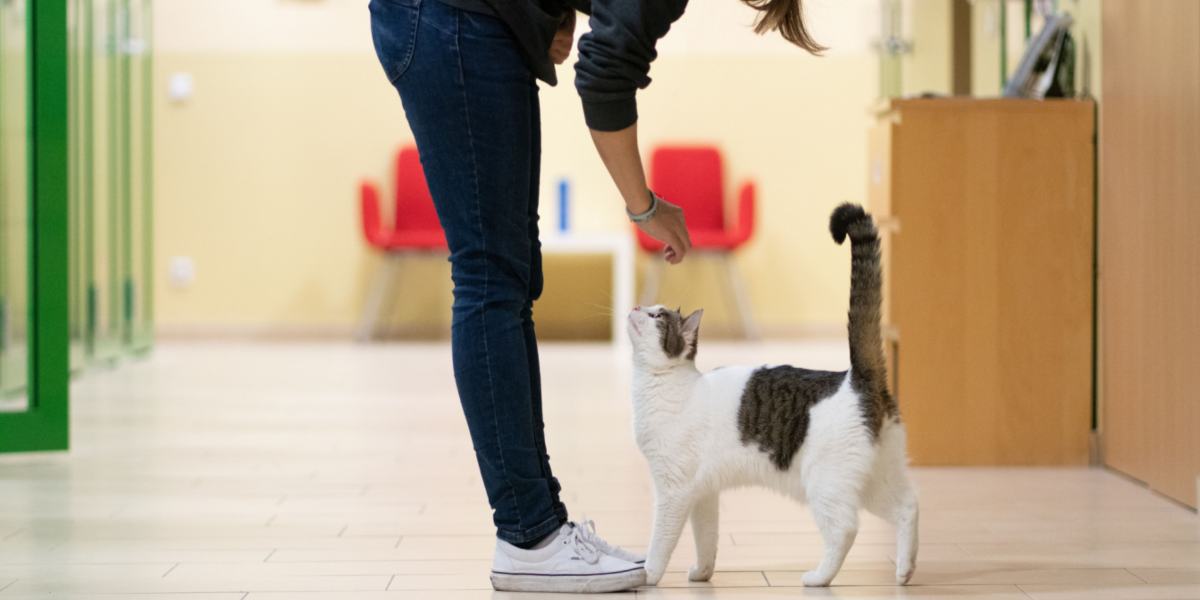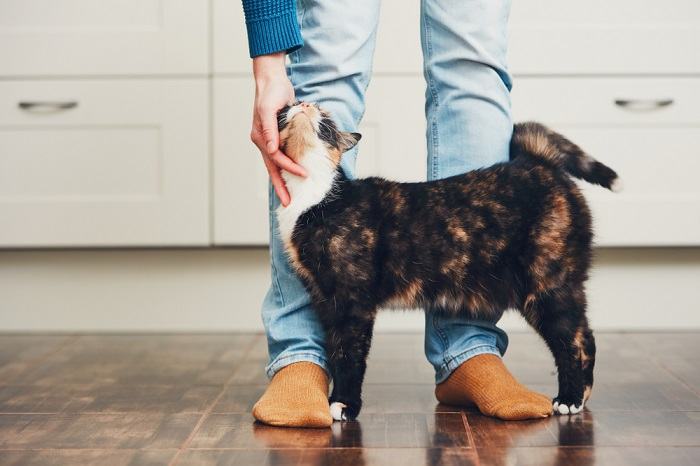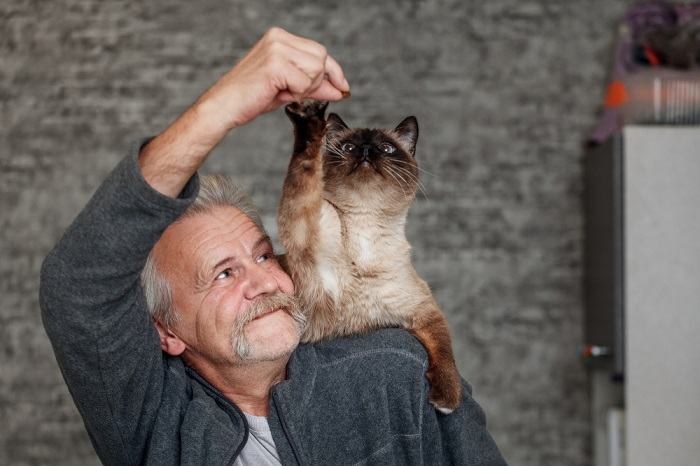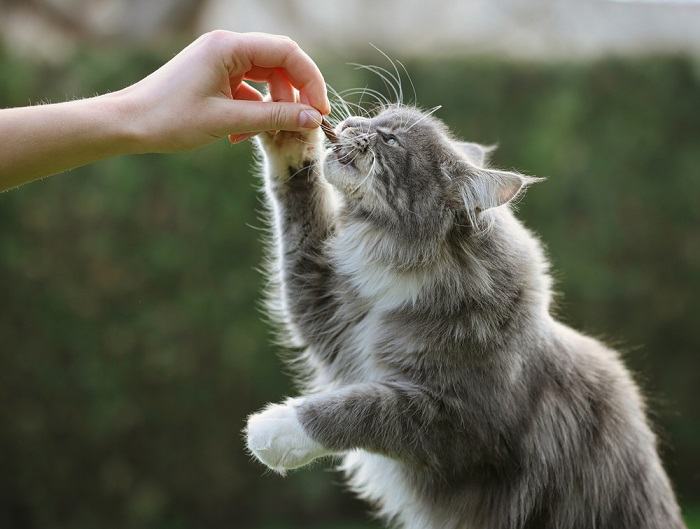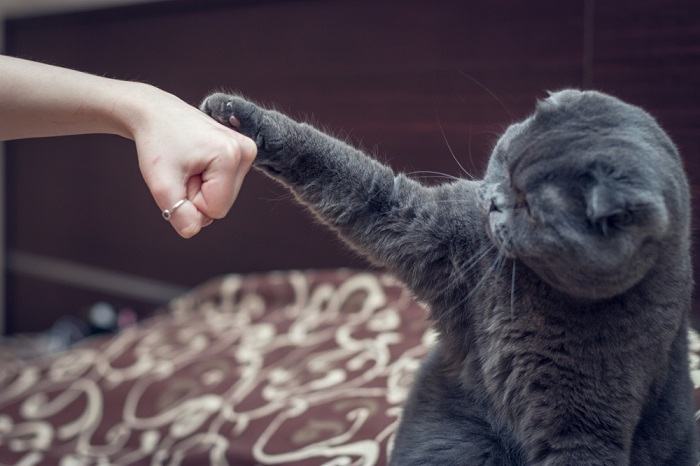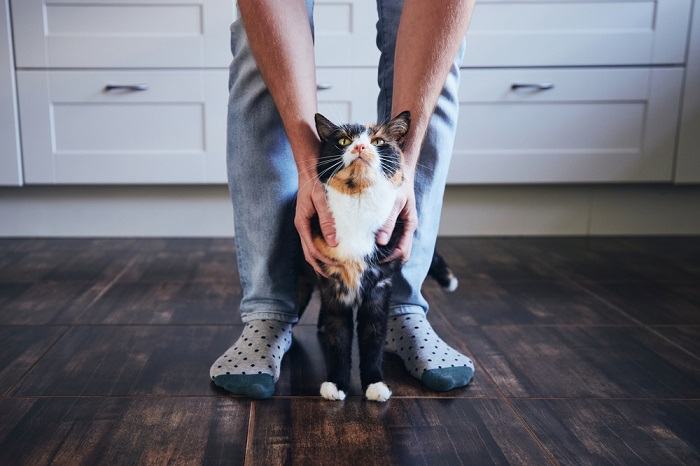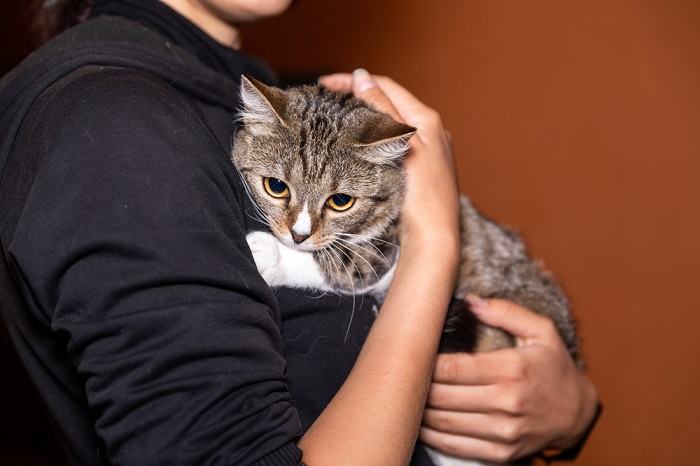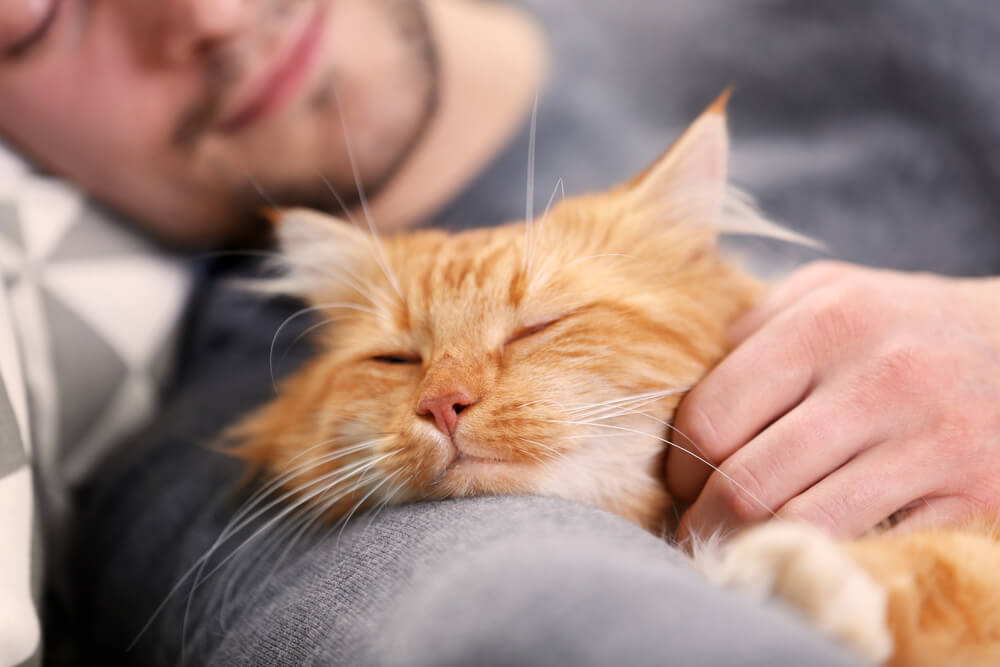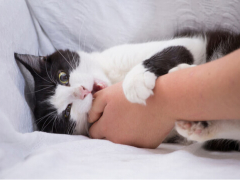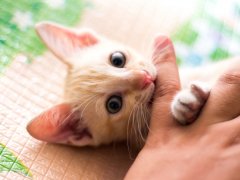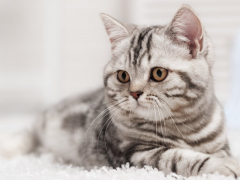Are you a pet parent to a clingy cat? Does your cat’s personality not allow you any alone time? Certain cat breeds are more predisposed to needing a constant cuddle, some cats suffer from separation anxiety, and some of our feline friends just enjoy spending time with their cat owner.
If you are constantly asking yourself, “Why does my cat follow me everywhere?” and want to know more about cat behavior and cat body language, or are concerned about signs of separation anxiety and your cat’s well-being, read on!
Here are some specific reasons for this common feline behavior and how to deal with it as a dedicated pet parent.
Top Reasons Why My Cat Might Follow Me Everywhere
#1 Curiosity
Curious cats follow you around simply to check out what you’re doing.
Cats are known for being curious creatures, and they do indeed like to know everything that is going on in their environment. If you leave a room, they may well follow you just to find out what you’re up to!
The original wild cats lived in social groups, and the domestic cats we know today retain that social structure and have even expanded their groups to include humans and other pets.
It is normal feline behavior for your cat to want to know what you are doing every minute of the day, and they enjoy spending time with you—even if that means they follow you into the bathroom!
#2 Hunger
Cats can be rather demanding when their food bowl is empty, and they will find a way to let you know it!
Ah, cupboard love. If your cat is always following you everywhere, it might be worth noticing if there is a pattern. Does your feline friend start pestering you at a certain time of day?
Cats are creatures of habit and love a routine. If you are a little late for mealtime, they’ll certainly let you know about it!
Some cats just love their grub, and so you may find the incessant following and meowing stops when the cat food appears at feeding time!
#3 Breed
Certain breeds are predisposed to being more vocal and friendly, and may follow you more than other cats.
Some cat breeds are known for being more clingy than others. So-called “Velcro breeds” include the Ragdoll, Siamese, Maine Coons, and Bengals.
These breeds have been selectively bred for many reasons, including their domesticity and attachment to their pet parents. This has resulted in breeds that are strongly attached to people and prefer to remain close to them at all times.
#4 Boredom And Play
If your cat is following you more than usual, they might be bored and looking for something fun to do.
Cats nowadays live more sedentary lives than their wild cat ancestors, as they have so many resources provided for them in easy reach: cat food, water, litter box, cat toys, and so much more. Many domestic cats are also indoor cats, meaning their scope to explore is restricted.
These cats, therefore, need lots of stimulation to prevent frustration and boredom. If they are constantly seeking attention from you, it may be that your cat feels bored and understimulated and needs some play or a cuddle to bond. If you own indoor cats, it helps to have plenty of opportunities for them to pursue normal feline behavior, such as play and scratching—even adult cats need plenty of playtime!
Also Read: How To Clean Your Cat’s Litter Box According to a Cat Behaviorist
Provide cat trees, cat toys, and safe chews, and try and set aside some time regularly to play with your feline friend. It might even tire them out enough to give you some alone time to get on with whatever you need to do without a constantly furry companion!
#5 Territory
Cats are known for being curious creatures, and they do indeed like to know everything that is going on in their environment.
Cats are territorial, and their core territory consists of the areas where they eat, sleep, and relax. This environment is hugely important to them, and it is normal cat behavior to keep a close eye on everything going on in their territory. If you move around in your home and your cat insists on following you, they are just making sure that all’s well in the home.
Also Read: 10 Tips To Train Your Cat To Sleep All Night
#6 Separation Anxiety
If your cat seems distressed in addition to clingy, something more serious might be going on.
Some cats take following you everywhere to a whole new level and can become very distressed by any separation from their owner. If this is the case, your cat may be suffering from separation anxiety, where any parting from the pet parent is distressing for them.
Signs of separation anxiety include:
- Becoming agitated or distressed when you try to leave, even aggressive.
- Excessive meowing when separated.
- Destructive behavior when left alone, such as scratching at furniture, scrabbling at doors, and ripping toys apart.
- Inappropriate toileting, for example finding poop by the door instead of by the litter box.
- Clingy, constantly wanting a cuddle or to be near you.
Also Read: Why Is My Cat Pooping On The Floor?
If you suspect your cat has separation anxiety, speak to your vet or veterinary behaviorist as your cat may need professional help.
Here are some things you can do to help when you leave your cat:
- Leave them with some cat toys or chews to keep them occupied.
- Leave an article of clothing with them that smells like you.
- Turn the TV or radio on when they are left alone as some background noise.
- Try synthetic pheromone sprays to help your stressed cat relax.
- Consider getting a second cat. Some cats do better with a companion, although this is a decision that requires some thought as to whether it is a good decision for your home and family life.
Sudden Changes
Cats are territorial, and their core territory consists of the areas where they eat, sleep, and relax.
Most cat owners become used to having a clingy cat and even enjoy the strong bond that constant companionship brings. However, if your cat is usually very independent but you find yourself asking, “Why does my cat suddenly not leave me alone?” it may be worth a checkup with your veterinarian.
Some medical conditions, such as hyperthyroidism, or any disease which causes chronic pain, can lead to changes in your cat’s behavior. This may be more relevant if you own an old cat, but any sudden behavior change can be a concern for your cat’s well-being and is worth investigating.
Conclusion
Some medical conditions, such as hyperthyroidism, or any disease which causes chronic pain, can lead to changes in your cat’s behavior.
Clingy cats: Whether you love them or become exasperated by them, this interesting feline behavior has a few different causes. It can be a perfectly normal expression of your cat’s personality, how territorial they are, their playfulness, and their strong bond with you.
However, some cats can suffer from separation anxiety, or even a health problem causing their propensity to stick close to you, so speak to your veterinarian if you are concerned.
Also Read: Top 10 Things Your Vet Wishes You Knew
Frequently Asked Questions
Is it normal for a cat to follow you everywhere?
Yes, it can be, especially for breeds like the Ragdoll or Maine Coons who are known for their strong attachments. Cats are reliant upon us for food, attention, and even entertainment. However, if they become suddenly more clingy, or become distressed when you leave them, they may be suffering from separation anxiety or a health condition.
Why does my cat want to be with me all the time?
Cats are social creatures and like to stay in a close-knit social group, especially female cats. They are also curious and territorial, meaning they like to know what is happening in their environment all the time. You are important to your cat; they like to stay close to you and check what you are up to!
How do you tell if your cat is bonded with you?
Cats form strong social bonds and will want to spend lots of time with those they are closest to. They may follow you everywhere, sleep close to you, and rub their face and body against you to share their pheromone scent communication with you.
